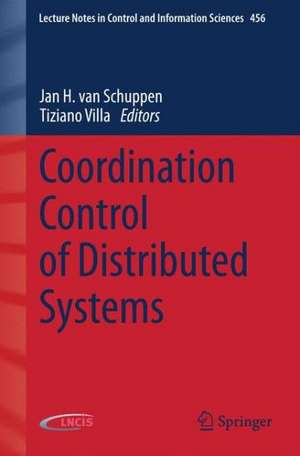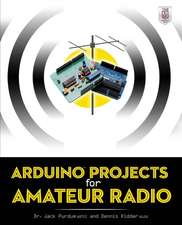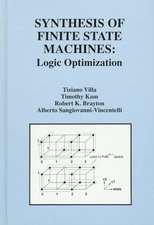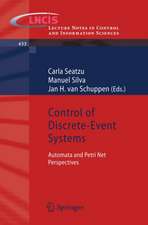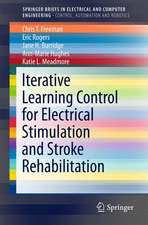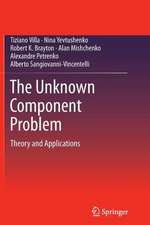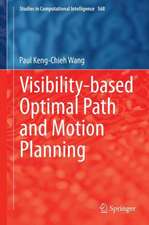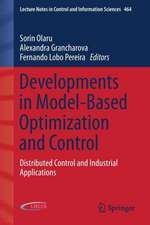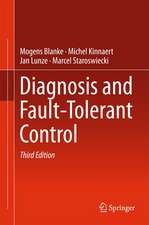Coordination Control of Distributed Systems: Lecture Notes in Control and Information Sciences, cartea 456
Editat de Jan H. van Schuppen, Tiziano Villaen Limba Engleză Paperback – 8 oct 2014
Examples and case studies are introduced in the first part of the text and developed throughout the book. They include:
- control of underwater vehicles,
- automated-guided vehicles on a container terminal,
- control of a printer as a complex machine, and
- control of an electric power system.
By reading the essays collected in the book Coordination Control of Distributed Systems, graduate students and post-docs will be introduced to the research frontiers in control of decentralized and of distributed systems. Control theorists and practitioners with backgrounds in electrical, mechanical, civil and aerospace engineering will find in the book information and inspiration to transfer to their fields of interest the state-of-art in coordination control.
Din seria Lecture Notes in Control and Information Sciences
- 18%
 Preț: 922.72 lei
Preț: 922.72 lei - 15%
 Preț: 669.13 lei
Preț: 669.13 lei - 18%
 Preț: 752.14 lei
Preț: 752.14 lei - 20%
 Preț: 613.14 lei
Preț: 613.14 lei - 18%
 Preț: 1068.14 lei
Preț: 1068.14 lei - 18%
 Preț: 1065.97 lei
Preț: 1065.97 lei - 20%
 Preț: 333.87 lei
Preț: 333.87 lei - 11%
 Preț: 506.65 lei
Preț: 506.65 lei - 20%
 Preț: 631.77 lei
Preț: 631.77 lei -
 Preț: 373.03 lei
Preț: 373.03 lei -
 Preț: 382.85 lei
Preț: 382.85 lei -
 Preț: 365.45 lei
Preț: 365.45 lei -
 Preț: 379.71 lei
Preț: 379.71 lei -
 Preț: 376.01 lei
Preț: 376.01 lei - 15%
 Preț: 617.72 lei
Preț: 617.72 lei - 15%
 Preț: 623.22 lei
Preț: 623.22 lei -
 Preț: 367.12 lei
Preț: 367.12 lei -
 Preț: 371.00 lei
Preț: 371.00 lei - 15%
 Preț: 616.77 lei
Preț: 616.77 lei - 15%
 Preț: 672.25 lei
Preț: 672.25 lei - 20%
 Preț: 321.03 lei
Preț: 321.03 lei -
 Preț: 365.29 lei
Preț: 365.29 lei -
 Preț: 524.42 lei
Preț: 524.42 lei -
 Preț: 375.81 lei
Preț: 375.81 lei -
 Preț: 407.60 lei
Preț: 407.60 lei -
 Preț: 378.21 lei
Preț: 378.21 lei -
 Preț: 367.85 lei
Preț: 367.85 lei - 18%
 Preț: 708.72 lei
Preț: 708.72 lei -
 Preț: 377.48 lei
Preț: 377.48 lei - 15%
 Preț: 620.38 lei
Preț: 620.38 lei - 15%
 Preț: 613.31 lei
Preț: 613.31 lei -
 Preț: 368.96 lei
Preț: 368.96 lei -
 Preț: 382.49 lei
Preț: 382.49 lei -
 Preț: 391.71 lei
Preț: 391.71 lei -
 Preț: 391.34 lei
Preț: 391.34 lei -
 Preț: 370.46 lei
Preț: 370.46 lei -
 Preț: 372.67 lei
Preț: 372.67 lei -
 Preț: 372.67 lei
Preț: 372.67 lei -
 Preț: 379.71 lei
Preț: 379.71 lei -
 Preț: 376.17 lei
Preț: 376.17 lei -
 Preț: 369.16 lei
Preț: 369.16 lei -
 Preț: 381.55 lei
Preț: 381.55 lei -
 Preț: 368.43 lei
Preț: 368.43 lei -
 Preț: 380.99 lei
Preț: 380.99 lei -
 Preț: 370.46 lei
Preț: 370.46 lei -
 Preț: 369.90 lei
Preț: 369.90 lei -
 Preț: 367.12 lei
Preț: 367.12 lei -
 Preț: 371.73 lei
Preț: 371.73 lei -
 Preț: 393.37 lei
Preț: 393.37 lei
Preț: 621.48 lei
Preț vechi: 731.15 lei
-15%
Puncte Express: 932
Preț estimativ în valută:
109.91€ • 130.32$ • 95.69£
109.91€ • 130.32$ • 95.69£
Carte tipărită la comandă
Livrare economică 30 martie-13 aprilie
Specificații
ISBN-13: 9783319104065
ISBN-10: 3319104063
Pagini: 398
Ilustrații: XIX, 398 p. 76 illus., 28 illus. in color.
Dimensiuni: 155 x 235 x 20 mm
Greutate: 0.59 kg
Ediția:2015
Editura: Springer International Publishing
Colecția Springer
Seria Lecture Notes in Control and Information Sciences
Locul publicării:Cham, Switzerland
ISBN-10: 3319104063
Pagini: 398
Ilustrații: XIX, 398 p. 76 illus., 28 illus. in color.
Dimensiuni: 155 x 235 x 20 mm
Greutate: 0.59 kg
Ediția:2015
Editura: Springer International Publishing
Colecția Springer
Seria Lecture Notes in Control and Information Sciences
Locul publicării:Cham, Switzerland
Public țintă
ResearchCuprins
Part I Case Studies in Control of Distributed Systems. -C4C Case Studies.- A Model Predictive Control Approach to AUVs Motion Coordination.- Dynamic Optimization Techniques for the Motion Coordination of Autonomous Vehicles.- Coordination challenges in networked vehicle systems: Are we missing something?.- Leader-Follower Coordination Control for Urban Traffic.- Prediction of Traffic Flow in a Road Network.- Zone-Control Based Traffic Control of Automated Guided Vehicles.- Coordination Control of Complex Machines.- Coordinated Model Predictive Control for Avoiding Voltage Collapse in an Electric Power Transmission Net.- Part II Architectures of distributed systems and their control.- System Architectures of Distributed and of Multilevel Systems.- Control Architectures.- Part III Coordination Control.- What is Coordination Control? .- Introduction to Coordinated Linear Systems.- Coordinated Linear Systems.- LQ Optimal Control for Coordinated Linear Systems.- Supervisory Control of Discrete-Event Systems.- Coordination Control of Distributed Discrete-Event Systems.- Part IV Distributed Control.- What is Team Theory?.- Team Theory and Information Structures of Stochastic Dynamic Decentralized Decision/- Signaling of Information.- Distributed Control of Manufacturing Networks: Analysis of Performance.- Part V Distributed Control with Communication.- What is Distributed Control with Direct Communication between Controllers?.- Communication Constraints in Control and Observation of Distributed Systems.- Information Structures.- Control Theory with Information Structures.- Common, Correlated, and Private Information in Control of Decentralized Systems.- Distributed State Estimation with Communication of Observations.- Part VI Multilevel Control.- Complexity and Scalability of Hierarchical Control for Networked Infrastructures.- Hierarchical Control for Road Traffic Management.-Part VII Communication and Control of Distributed Systems.- Layered BackpressureScheduling for Delay-Aware Routing in Ad Hoc Networks.- Cache Control Issues in Pub-Sub Networks and Wireless Sensor Networks.- Detecting Influential Nodes in Complex Networks with Range Probabilistic Control Centrality.- Model Predictive Controllers over Differentiated Services Packet Networks.- A System C/Matlab Co-Simulation Tool for Networked Control Systems.- On Shannon’s Duality of a Source and a Channel and Nonanticipative Communication and Communication.- Directed information on Abstract Spaces: Properties and Extremum Problems.- Information Nonanticipative Rate Distortion Function and its Applications.- Nonanticipative Duality of Sources and Channels with Memory and Feedback.- Part VIII Informatics of Distributed Systems – Modeling and Verification.- An Introduction to the Verification of Hybrid Systems using ARIADNE.- Formal Verification Applied to Robotic Surgery.- Computing Reachable Sets of Differential Inclusions.- Modeling Objects Moving in a Complex Environment with World Automata.- Distributed Average Consensus in Digraphs.- Part IX Research Program.- Research Program for Control of Distributed and of Multilevel Systems A Model Predictive Control Approach to AUVs Motion Coordination.- Dynamic Optimization Techniques for the Motion Coordination of Autonomous Vehicles.- Coordination challenges in networked vehicle systems: Are we missing something?.- Leader-Follower Coordination Control for Urban Traffic.- Prediction of Traffic Flow in a Road Network.- Zone-Control Based Traffic Control of Automated Guided Vehicles.- Coordination Control of Complex Machines.- Coordinated Model Predictive Control for Avoiding Voltage Collapse in an Electric Power Transmission Net.- Part II Architectures of distributed systems and their control.- System Architectures of Distributed and of Multilevel Systems.- Control Architectures.- Part III Coordination Control.- What is Coordination Control? .- Introduction to Coordinated Linear Systems.- Coordinated LinearSystems.- LQ Optimal Control for Coordinated Linear Systems.- Supervisory Control of Discrete-Event Systems.- Coordination Control of Distributed Discrete-Event Systems.- Part IV Distributed Control.- What is Team Theory?.- Team Theory and Information Structures of Stochastic Dynamic Decentralized Decision/- Signaling of Information.- Distributed Control of Manufacturing Networks: Analysis of Performance.- Part V Distributed Control with Communication.- What is Distributed Control with Direct Communication between Controllers?.- Communication Constraints in Control and Observation of Distributed Systems.- Information Structures.- Control Theory with Information Structures.- Common, Correlated, and Private Information in Control of Decentralized Systems.- Distributed State Estimation with Communication of Observations.- Part VI Multilevel Control.- Complexity and Scalability of Hierarchical Control for Networked Infrastructures.- Hierarchical Control for Road Traffic Management.-Part VII Communication and Control of Distributed Systems.- Layered Backpressure Scheduling for Delay-Aware Routing in Ad Hoc Networks.- Cache Control Issues in Pub-Sub Networks and Wireless Sensor Networks.- Detecting Influential Nodes in Complex Networks with Range Probabilistic Control Centrality.- Model Predictive Controllers over Differentiated Services Packet Networks.- A SystemC/Matlab Co-Simulation Tool for Networked Control Systems.- On Shannon’s Duality of a Source and a Channel and Nonanticipative Communication and Communication.- Directed information on Abstract Spaces: Properties and Extremum Problems.- Information Nonanticipative Rate Distortion Function and its Applications.- Nonanticipative Duality of Sources and Channels with Memory and Feedback.- Part VIII Informatics of Distributed Systems – Modeling and Verification.- An Introduction to the Verification of Hybrid Systems using ARIADNE.- Formal Verification Applied to Robotic Surgery.- Computing Reachable Sets ofDifferential Inclusions.- Modeling ObjectsMoving in a Complex Environment with World Automata.- Distributed Average Consensus in Digraphs.- Part IX Research Program.- Research Program for Control of Distributed and of Multilevel Systems
Notă biografică
The book is an edited collection. The background of the authors of the book includes:
control engineering, control theory, mathematics, communication networks, informatics, marine engineering, traffic engineering, engineering of automated vehicles, control of printers, etc. Jan H. van Schuppen is affiliated as professor emeritus with the Department of Mathematics of Delft University of Technology in Delft, The Netherlands where he still teaches and advises and is further active with his consulting company Van Schuppen Control Research in Amsterdam, The Netherlands, since his retirement in October 2012.
His research interests include: control of decentralized and distributed systems, control of hybrid systems, control of discrete-event systems, realization, system identification, control of motorway networks and modeling and identification of biochemical reaction networks.
He is Advising Editor of the journal Mathematics of Control, Signals, and Systems and in the period 2008--2011 was coordinator of the project Control for coordination of distributed systems which was financially supported by the European Commission.
control engineering, control theory, mathematics, communication networks, informatics, marine engineering, traffic engineering, engineering of automated vehicles, control of printers, etc. Jan H. van Schuppen is affiliated as professor emeritus with the Department of Mathematics of Delft University of Technology in Delft, The Netherlands where he still teaches and advises and is further active with his consulting company Van Schuppen Control Research in Amsterdam, The Netherlands, since his retirement in October 2012.
His research interests include: control of decentralized and distributed systems, control of hybrid systems, control of discrete-event systems, realization, system identification, control of motorway networks and modeling and identification of biochemical reaction networks.
He is Advising Editor of the journal Mathematics of Control, Signals, and Systems and in the period 2008--2011 was coordinator of the project Control for coordination of distributed systems which was financially supported by the European Commission.
Textul de pe ultima copertă
This book describes how control of distributed systems can be advanced by an integration of control, communication, and computation. The global control objectives are met by judicious combinations of local and nonlocal observations taking advantage of various forms of communication exchanges between distributed controllers. Control architectures are considered according to increasing degrees of cooperation of local controllers: fully distributed or decentralized control, control with communication between controllers, coordination control, and multilevel control. The book covers also topics bridging computer science, communication, and control, like communication for control of networks, average consensus for distributed systems, and modeling and verification of discrete and of hybrid systems.
Examples and case studies are introduced in the first part of the text and developed throughout the book. They include:
By reading the essays collected in the book Coordination Control of Distributed Systems, graduate students and post-docs will be introduced to the research frontiers in control of decentralized and of distributed systems. Control theorists and practitioners with backgrounds in electrical, mechanical, civil and aerospace engineering will find in the book information and inspiration to transfer to their fields of interest the state-of-art in coordination control.
Examples and case studies are introduced in the first part of the text and developed throughout the book. They include:
- control of underwater vehicles,
- automated-guided vehicles on a container terminal,
- control of a printer as a complex machine, and
- control of an electric power system.
By reading the essays collected in the book Coordination Control of Distributed Systems, graduate students and post-docs will be introduced to the research frontiers in control of decentralized and of distributed systems. Control theorists and practitioners with backgrounds in electrical, mechanical, civil and aerospace engineering will find in the book information and inspiration to transfer to their fields of interest the state-of-art in coordination control.
Caracteristici
Explains how the integration of control, communication and informatics can be used for more effective exploitation of multi-subunit systems Focuses throughout on case-study and example material keeping the theoretical development relevant to real systems Short expository chapters provide quick efficient introductions to many different topics Includes supplementary material: sn.pub/extras
